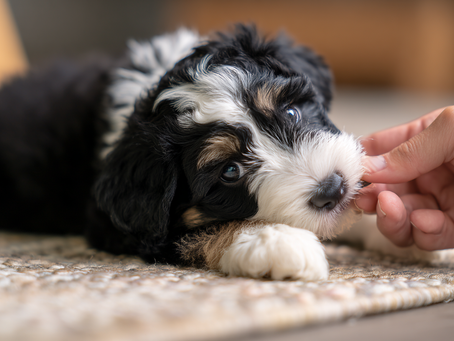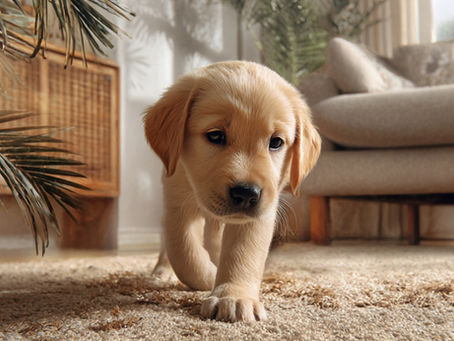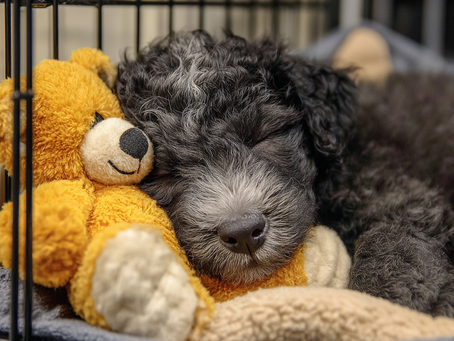top of page
All Posts


Understanding the Fear Period: What It Is and How to Support Confidence
A fear period is a developmental stage when a puppy's brain becomes more sensitive to new or startling experiences. You can think of it as nature's way of helping young animals develop caution for survival as they explore the world more independently.
nannykp76
2 hours ago5 min read


Hand Feeding Puppies for Focus, Bonding, and Trust
When a puppy eats from your hand, their brain releases oxytocin, the hormone linked to bonding. You, the caregiver, experience this as well. Over time, these repeated moments strengthen the attachment between you and your puppy, creating a relationship built on trust and security.
nannykp76
1 day ago5 min read


Using Food to Build Calmness, Not Excitement
Food, when used thoughtfully, becomes much more than reinforcement. It is a daily chance to teach calmness, patience, and trust. From hand-feeding to enrichment to structured meal routines, every bite can shape not only behavior but also emotional balance.
nannykp76
2 days ago5 min read


The Role of Treats in Shaping Positive Behavior
Treats are far more than snacks. They are a language of communication, a tool for trust, and a way to shape both behavior and emotional well-being.
When used with intention, treats help a puppy learn faster, feel safer, and connect more deeply with their human. They are not bribes. They are clear signals that say, "this was the right choice".
From the first sit to the most advanced training, from early socialization to handling life's challenges, treats can guide your p
nannykp76
3 days ago5 min read


Understanding Puppy Tummies: Signs of Sensitivities or Overfeeding
Do not rely on your puppy's eagerness for food as a sign they need more. Many puppies will beg even when they are full. Overfeeding increases the risk of rapid weight gain, joint strain, and health problems later in life. On the other hand, underfeeding can limit energy and slow development.
Review your puppy's portions regularly and adjust as they grow. Balance is not just about quantity, but about timing, quality, and how your puppy responds to their diet.
nannykp76
4 days ago5 min read


Choosing Between Kibble, Raw, or Fresh Food: Understanding the Options Without the Judgment
Puppies are not just small versions of adult dogs. Their bones, joints, muscles, brain, and immune system are developing at incredible speed. Nutrition during the first year lays the foundation for lifelong health. Inadequate or imbalanced diets can lead to problems such as stunted growth, orthopedic conditions, or weakened immunity. That is why making a thoughtful choice, no matter which style of feeding you prefer, is so valuable.
Think of it as filling a building with str
nannykp76
5 days ago6 min read


How to Introduce a Puppy to the Leash, Collar, and Harness
Introducing a collar, harness, and leash with patience and encouragement helps create a confident, cooperative partner. This process is not just about gear. It is about communication, trust, and creating a positive association with handling and exploration.
nannykp76
6 days ago5 min read


What Are Marker Words in Dog Training and Why They Matter
"Dogs live in the moment. Without a marker, even a short delay between the behavior and the reward can cause confusion." A Simple Yet...
nannykp76
Oct 125 min read


Teaching Sit, Down, and Wait: Early Obedience That Builds Confidence
Every time a puppy learns a new skill, they are not just becoming obedient. They are learning how to think, respond, and feel secure in their world. Sit, down, and wait are small behaviors that open the door to bigger confidence and deeper connection.
nannykp76
Oct 114 min read


Building a Foundation for Recall: Teaching "Come" from Day One
Good recall is not something you teach once and then forget. It is a lifelong skill. Even adult dogs benefit from regular practice and refresher sessions, especially in new environments or around higher distractions.
The work you put in during puppyhood pays off for years. You will have a dog who comes joyfully and without hesitation because they learned that being near you is always rewarding.
nannykp76
Oct 105 min read


Teaching the Name Response: How to Build Focus and Engagement
A name response is not about obedience. It is about connection. Before you can teach skills like "come", "stay", or “leave it,” your puppy first needs to be paying attention. If your puppy is not looking at you or tuned in to your presence, the rest of the training quickly falls apart.
nannykp76
Oct 95 min read


The Importance of Consistency in the First Few Weeks
The more consistent the household is in the first few weeks, the easier it becomes to teach, bond, and enjoy life with a growing puppy. Structure does not limit freedom. It gives the puppy the confidence to explore, learn, and settle in.
Through repetition, clear expectations, and shared family routines, you are not just teaching skills. You are shaping a confident, happy dog who understands their place in your world. And that understanding is the key to a peaceful home f
nannykp76
Oct 85 min read


Puppy Sleep Schedules: How Much Sleep Is Normal and How to Encourage It
Sleep is one of the most powerful tools for raising a healthy, happy puppy. In those first months of life, their brain is constantly forming new connections, their body is changing almost daily, and they are learning how to navigate a brand-new world. All of that takes energy and a lot of it.
nannykp76
Oct 74 min read


Creating a Gentle Routine for Puppies 8 to 16 Weeks Old
Between eight and sixteen weeks, your puppy will grow and change faster than at almost any other stage in their life. A gentle, flexible routine helps them navigate this time with confidence.
Keep it simple, predictable, and responsive. Make space for calm anchors throughout the day. Stay observant and adjust as needed. Most importantly, let your routine be a framework for connection and one that shows your puppy they are safe, understood, and loved in your care.
nannykp76
Oct 64 min read


First Vet Visit: What to Bring, Expect, and Ask
A positive first experience can make future visits easier, while a stressful one can stick in your puppy's memory for a long time. Puppies are incredibly impressionable in these early weeks. If they leave the vet feeling safe and supported, that memory will shape how they approach medical care in the future.
nannykp76
Oct 54 min read


How to Puppy-Proof Your Home Room by Room
Bringing home a new puppy is one of the most exciting and joyful moments in a pet parent's life. Those first days are filled with cuddles, little bursts of play, and the wide-eyed wonder of a tiny dog discovering their new world. But along with the joy comes an important responsibility: making sure that world is safe.
nannykp76
Oct 45 min read


Setting Up a Puppy Zone: Crate, Potty Area (if applicable), and Play Space
A designated puppy space meets three essential early needs:
A safe, predictable rest spot that encourages relaxation and builds security.
A clear potty area to jumpstart house training with consistency.
A structured play space for enrichment and connection without overstimulation.
nannykp76
Oct 35 min read


Essential Puppy Gear Checklist: What's Actually Worth Buying
Discover the essential puppy gear every new dog parent truly needs. Save money, reduce stress, and create a safe, comforting home for your pup.
nannykp76
Oct 24 min read


The First 72 Hours with a New Puppy: What to Expect and How to Prepare
Learn exactly what to do during your puppy’s first 3 days home to build trust, set routines, and start a confident life together.
nannykp76
Oct 16 min read
bottom of page